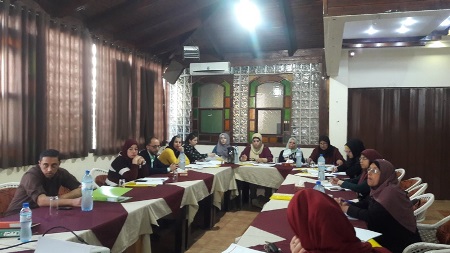|
MIFTAH completes training workshops on guidebook assessing commitment to the gender charter for the Gender Forum in Local Governance
Ramallah – MIFTAH recently completed training workshops on an “Assessment Guidebook on Commitment to the Gender Charter” for the Gender Forum and Local Governance in Gaza. The workshops targeted 20 participants who represent the Gender Forum in Local Governance, with the overall objective of improving the role of civil society institutions and members of the gender forum on how to assess and follow-up the level of LGU commitment to the Gender Charter and determine the parties assessing this commitment. They also aimed at shedding light on evaluation measures for implementing the charter through the six main axes (governance, environment management and organization, planning and development, accountability, transparency and services). Recommendations The recommendations included holding a training course for the forum’s member institutions on writing skills and preparing draft proposals centered on the assessment guidebook for LGU commitment to the gender charter in order to build on the interventions developed by the participants. Further to this, the recommendations called on forum member institutions to include their strategic plans for activities that promote their role in holding LGU’s accountable for the main criteria in the assessment guide. Lana Jabr, from the Aisha Association for Women and Child Protection in the Gaza Strip, said the training responded to many of her ambitions, especially in terms of women and children in Gaza, who face several municipal problems. “We need more of these quality workshops; we hope they will continue and build on the recommendations, especially since our association works towards gender integration in LGUs with a special focus on the role of women and youth in this regard, to create capable young women leaders who fully understand their role.” MIFTAH’s Gaza Strip coordinator, Shadia Al Ghoul said the training proceeded according to plan without any notable hitches and was based on the proposed training plan including training techniques. This, she said, largely contributed to elevating the performance of participant forum members. She also said that revising the training material with MIFTAH and adapting them with the training’s needs helped in guaranteeing improved technical performance in the training process. Al Ghoul said promoting a response from LGUs to gender and empowering female LGU members to carry out their role efficiently and responsibly is a means of reaffirming the principles of equality in local governance, which she maintained is a basic pillar in the process of participation in development and decision making at the local level. It is also a space that reflects the needs of local women as part of policies and programs within their local councils. Al Ghoul said this was why we must fall back on the criteria of good governance and promote citizenship related to sustainability, decentralization, equity, efficiency, effectiveness, accountability, transparency, civic participation and security, adding that this criteria should in principle, be applied to both men and women alike. MIFTAH project manager Najwa Yaghi-Sandouka said these interventions were part of the project, “Men and Women towards institutionalizing gender equality in local governance”, funded by GIZ with a mandate from BMZ (Federal Ministry for Economic Cooperation and Development). This is within the “Empowering Women in decision–making in the Middle East (LEAD)”project, aimed at promoting an enabling inclusive environment for integrating gender in local government policies.

http://www.miftah.org |